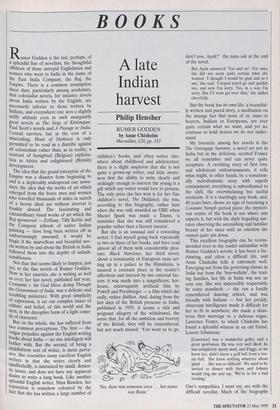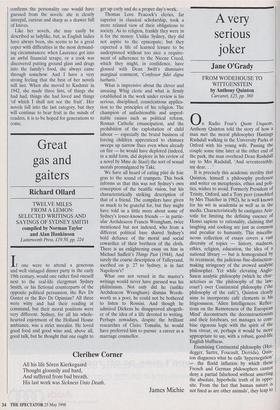BOOKS
A late Indian harvest
Philip Hensher
RUMER GODDEN by Anne Chisholm Macmillan, £20, pp. 333 Ruiner Godden is the last, perhaps, of a splendid line of novelists, the thoughtful offshoot of those intrepid Englishmen and women who went to India in the name of the East India Company, the Raj, the Empire. There is a common assumption these days, particularly among academics, that colonialist novels, for instance novels about India written by the English, are necessarily inferior to those written by Indians, and everywhere one sees a slightly sniffy attitude even to such unarguably great novels as The Siege of Krishnapur, Paul Scott's novels and A Passage to India. Conrad survives, but at the cost of a misreading; Heart of Darkness is only permitted to be read as a diatribe against all colonialism rather than, as in reality, a contrast of benighted (Belgian) exploita- tion in Africa and enlightened (British) development.
The idea that the grand enterprise of the Empire was a disaster from beginning to end is a deplorably widespread one nowa- days; the idea that the works of art which emerged from the brave men and women who travelled thousands of miles in search of a heroic ideal are without interest is frankly absurd. The fascinating and extraordinary visual works of art which the Raj sponsored — Zoffany, Tilly Kettle and the Company schools of native Indian painting — have long been written off as embarrassingly unsound; it would be tragic if the marvellous and beautiful nov- els written by and about the British in India followed them into the depths of unfash- ionableness.
Not that that seems likely to happen, just yet, to the fine novels of Rumer Godden. Now in her nineties, she is writing as well as ever; her last novel, published last year, Cromartie v. the God Shiva Acting Through the Government of India, was a delicate and troubling miniature. With great simplicity of expression, it set out complex issues of culture and belief, of this world and the next, in the deceptive form of a light come- dy of character.
But on the whole, she has suffered from two common perceptions. The first — the Agar prejudice against the English writing books about India — no one intelligent will bother with. But the second, of being a middlebrow sort of writer, is more perva- sive. She resembles many excellent English writers in that she writes clearly and unaffectedly, is interested by small, domes- tic issues, and does not have any apparent desire to write a long book. Like another splendid English writer, Nina Bawden, her reputation is somehow coloured by the fact that she has written a large number of children's books, and often writes else- where about childhood and adolescence; there is a slight suspicion that she is not quite a grown-up writer, and little aware- ness that the ability to write clearly and strikingly enough to interest the young is a gift which any writer would love to possess. The only prize she has won is for her fine children's novel, The Diddakoi; she was, according to this biography, rather hurt when she was only awarded an OBE when Muriel Spark was made a Dame, 'a reminder that she was still considered a popular rather than a literary success'.
But she is an unusual and a rewarding writer; I find myself going back repeatedly to two or three of her books, and have read almost all of them with considerable plea- sure. Black Narcissus, her third novel, about a community of European nuns set- ting up in a palace in the Himalayas, is assured a constant place in the reader's affections and interest by two external fac- tors: it was made into a magnificent, hot- house, extravagantly artificial film by Powell and Pressburger — a film which she sadly, rather dislikes. And, dating from the last days of the British presence in India, published in 1939, it seems a rich and poignant allegory of the withdrawal, the sense that, for all the ambition and bravery of the British, they will be remembered, but not much missed. 'You want us to go, 'Yes, there was someone once . . . her name was Rosie.' don't you, Ayah?' the nuns ask at the end of the novel.
But Ayah answered 'Yes and no'. For once she did not seem quite certain what she wanted. 'I thought I would be glad and so am,' she said. 'I hoped you'd go and quickly too, and now I'm sorry. Yes, in a way I'm sorry. But I'll soon get over that,' she added cheerfully.
But the book has its own life; a beautiful- ly written and paced story, a meditation on the strange fact that none of us, nuns or bearers, Indians or Europeans, are ever quite certain what we want, and yet we continue to hold desires we do not under- stand.
My favourite among her novels is the The Greengage Summer, a novel set not in India but in the delicious, scented France we all remember and can never quite recapture. A ravishing story of first love and adolescent embarrassments, it tells what might, in other hands, be a sensation- ally melodramatic story with superb containment; everything is subordinated to the idyll, the overwhelming but tactful eroticism. It is a startlingly sexy book, and, 40 years later, shows no sign of becoming a Constant Nymph period piece; the mysteri- ous centre of the book is not where one expects it, but with the shyly beguiling nar- rator observing the astonishing and familiar beauty of her sister with an emotion she cannot quite pin down.
This excellent biography can be recom- mended even to the reader unfamiliar with Rumer Godden's novels; it has been a fas- cinating, and often a difficult life, and Anne Chisholm tells it extremely well. Emerging not from the governing classes in India but from the 'box-wallahs', the trad- ing families, her life in India was not an easy one. She was impeccably respectable by some standards — she ran a fondly remembered dancing school, and was friendly with Indians — but her prickly, observant intelligence made it difficult for her to fit in anywhere; she made a disas- trous first marriage to a dubious rogue, Laurence Foster, to which Chisholm has found a splendid witness in an old friend, Lenore Johnstone:
[Laurence] was a wonderful golfer and a great sportsman. He was very well liked; he was completely sports mad, and Peggy, as we knew her, didn't know a golf ball from a ten- nis ball. She knew nothing whatever about sport ... She was so difficult! We used to be invited to dinner with them and Johnny would ring me and say, 'We're in for a bad evening.'
One's sympathies, I must say, are with the difficult novelist. Much of the biography confirms the personality one would have guessed from the novels: she is clearly intrepid, curious and sharp as a drawer full of knives.
Like her novels, she may easily be described as ladylike, but, as English ladies have always been, she seems to be a great coper with difficulties in the most demand- ing circumstances: when Laurence got into an awful financial scrape, or a cook was discovered putting ground glass and drugs into the family's food, she always came through somehow. And I have a very strong feeling that the best of her novels will last. When she moved to Kashmir in 1942, she made three lists, of things she had had, things she had loved and things `of which I shall not see the fruit'. Her novels fall into the last category, but they will continue to bear fruit in the minds of readers, it is to be hoped for generations to come.



































































 Previous page
Previous page